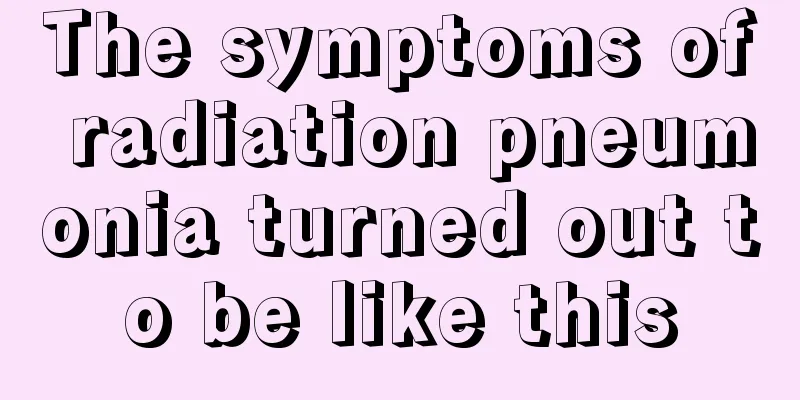The symptoms of radiation pneumonia turned out to be like this

|
Radiation pneumonitis is a form of pneumonia that results from inflammation caused by damage to lung tissue following radiation therapy for a malignant tumor. So what are the symptoms of radiation pneumonitis? Most people don't really understand this. In fact, patients with mild radiation pneumonia have no symptoms, while patients with more severe cases will show symptoms such as dry cough, palpitations, and chest pain. Clinical manifestations In mild cases, there are no symptoms. Symptoms usually appear 2 to 3 weeks after radiotherapy, often with an irritating, dry cough, accompanied by shortness of breath, palpitations and chest pain, no fever or low fever, and occasionally high fever. Shortness of breath progressively worsens with the worsening of pulmonary fibrosis, which can easily lead to respiratory infections and aggravate respiratory symptoms. Dysphagia may occur when radiation esophagitis occurs. If radiation damages the ribs, rib fractures will occur, with obvious tenderness in the local area. Physical examination revealed atrophy and hardening of the skin in the irradiated area, and dry and moist rales and friction sounds were heard in the lungs. Extensive and severe pulmonary fibrosis eventually leads to high lung function and cor pulmonale, with corresponding signs. Testing Changes in lung function: Both radiation pneumonitis and fibrosis cause restrictive ventilation dysfunction, decreased lung compliance, accompanied by a decreased ventilation/blood flow ratio and decreased diffusion function, leading to hypoxia. Sometimes lung function tests show changes even though a chest x-ray may not reveal any abnormalities. X-ray manifestations: Most cases develop shadows in the lungs one month after stopping radiotherapy. In the acute phase, warm, flake-like, blurred shadows appear on the irradiated lung field, with faint reticular shadows in between, which resemble bronchopneumonia or pulmonary edema. The range of the lesion is consistent with the irradiation field of the chest surface. Chronic pulmonary fibrosis occurs, presenting as cord-like or mass-like contraction or localized atelectasis. There are a lot of adhesions between the mediastinal pleura and pericardium, the mediastinum is displaced to the affected side, the ipsilateral diaphragm is elevated, and the chest collapses. prevention The key to the prevention and treatment of radiation pneumonitis lies in "prevention"; the key to "prevention" lies in the following three points: (1) Strictly control the radiation dose: generally, a conventional dose of 2500 rad within 5 weeks is relatively safe. (2) Control the radiation field. The larger the radiation field, the higher the incidence rate. (3) Choose an appropriate irradiation rate with a weekly dose of 800-1000 rad. Once the disease is discovered, treatment should be started as soon as possible to block the progression of the disease. If extensive pulmonary fibrosis has occurred, the prognosis is poor. |
<<: This is what AIDS rash looks like
>>: It turns out that there are these dos and don'ts in the diet for pulmonary arterial hypertension
Recommend
Ganoderma lucidum and roe deer powder
The spore powder of Ganoderma lucidum is a medici...
Are the hearts in the same position for men and women?
The heart is very important to everyone. Generall...
What do the three coagulation tests check?
Coagulation and platelets are closely related. Ge...
What should I do if there are mountain crickets at home
Mountain crickets are also called centipedes or m...
What are the mid-term symptoms of colorectal cancer
When colorectal cancer develops to a certain exte...
What to do if your child's tear duct is blocked
Everyone has two tear ducts in their eyes. When p...
Causes of nasopharyngeal carcinoma
What is the cause of nasopharyngeal cancer? The m...
Can white vinegar cure hemorrhoids?
Hemorrhoids are not unfamiliar to office white-co...
What causes pain under the chin
Some people experience unexplained pain under the...
Several early symptoms of gastric cancer
The early symptoms of gastric cancer may not be s...
How to remove oil stains
When things get stained with oil, people always l...
What are the characteristics of different types of thyroid cancer
Thyroid cancer is a common endocrine tumor in cli...
How to adjust the initial anti-aging diet?
Every female friend reaches the age of 25. The mo...
Will eating pistachios make you fat?
Will eating pistachios make you fat? Before answe...
Zhangmutou termite control
Termites have a unique "eating, living and t...









